|
|
|
Sort Order |
|
|
|
Items / Page
|
|
|
|
|
|
|
| Srl | Item |
| 1 |
ID:
150833
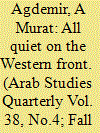

|
|
|
|
|
| Summary/Abstract |
The March 17, 2015 parliamentary elections were held roughly two years after the previous elections. According to the results, the incumbent Prime Minister Benjamin Netanyahu has formed the new government. It controls 61 parliamentary seats, and is a narrow, right-wing and ultra-Orthodox government with the narrowest of Knesset majorities. Its composition shows that it would be one of the most right-wing administrations in Israel's history, and there is hardly a mention or plan of resolving the Palestinian conflict. This article tries to analyze whether the electoral results open up new possibilities for the peace process and Israel's security agenda.
|
|
|
|
|
|
|
|
|
|
|
|
|
|
|
|
| 2 |
ID:
127938
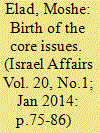

|
|
|
|
|
| Publication |
2014.
|
| Summary/Abstract |
In the last two decades, the Israeli-Palestinian conflict has been highly identified with the dispute over the core issues: Israel's annexation of East Jerusalem, the establishment of settlements in the disputed territories, the final borders between the two parties and the Palestinian refugee problem. The first three issues were a result of the 1967 war, while the refugee problem was a corollary of the 1948 war. However, it was the Israeli administration from 1967 to 1976 that exposed refugee camps to the Israeli public and made some initial efforts to resolve the problem.
|
|
|
|
|
|
|
|
|
|
|
|
|
|
|
|
| 3 |
ID:
171676
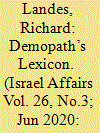

|
|
|
|
|
| Summary/Abstract |
This article examines a double discourse by the Palestinian leadership, one in English and one in Arabic, which plays a central role in their negotiating strategy with Israel since the onset of the Oslo ‘peace process’ (1993). Using language very close to Western terminology, Palestinians in English speak of ‘Occupation’ and ‘Settlements’ with the 1967 borders as the defining issue; while in Arabic, they speak of ‘Occupation’ and ‘Settlements’ in terms of the 1948 borders (i.e., all of Israel is an ‘Occupation’ and Tel Aviv is an illegal ‘settlement’). As a zero-sum negotiating strategy this makes perfect sense: convince Israel to concede ‘land for peace’ (1967 borders), when in reality this means ‘land for war’ (1967 borders as launching pad for war to 1948 borders). The western news media, allegedly committed to accurate reporting, shows no knowledge of the Arabic discourse and presents what Palestinians say in English as reliable reflections of their actions and intentions. As a result of this failure to identify the double-discourse, the Western legacy media presents Palestinian war propaganda as news to their Western audiences, unwittingly helping the Palestinians in their deception.
|
|
|
|
|
|
|
|
|
|
|
|
|
|
|
|
| 4 |
ID:
177273
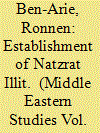

|
|
|
|
|
| Summary/Abstract |
Natzrat Illit (‘Upper Nazareth’) was one of the dozens of ‘new towns’ established by the state of Israel during the 1950s, following the 1948 war. However, because of its unique location, in the midst of a region widely inhabited by a Palestinian population, and the specific objectives of its establishment, the penetration of a Jewish population into the region and the reinforcement of control over Nazareth, the only Palestinian city that survived the war and remained within the borders of the newly established state, it demanded particular means and forms of action. Based on archival materials, this article delineates the particular methods and practices used to confront and overcome the specific conditions set for the establishment of Natzrat Illit. These methods and practices will later become advantageous when similar objectives would be set for the state-led expansive settlement project into new territories.
|
|
|
|
|
|
|
|
|
|
|
|
|
|
|
|
| 5 |
ID:
169349
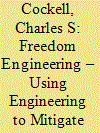

|
|
|
|
|
| Summary/Abstract |
The extreme conditions of all extraterrestrial environments restrict freedom of movement and encourage social, political and economic arrangements friendly to tyranny. However, deliberately engineered measures might be taken to maximise liberty in the space environment. For example, space settlements can be engineered to maximise the number of oxygen, food, water and power systems to disallow coercive regimes the opportunity to control single machines on which entire settlements depend. Spacesuits can be engineered to be easily manufactured and maintained, thus maximising the number available to occupants of a settlement and minimising the extent to which bespoke and difficult-to-service suits restrict freedom of movement. Other examples of this approach to engineering are provided, which we might term ‘freedom engineering’. Although attempts to deliberately engineer freedom into a settlement turn on the definition of ‘freedom’, it is suggested that objective criteria in the enhancement of certain types of individual and collective liberty can be used to determine when an act of freedom engineering is likely to be beneficial for a settlement. The space policy implications of these ideas are discussed.
|
|
|
|
|
|
|
|
|
|
|
|
|
|
|
|
| 6 |
ID:
130501
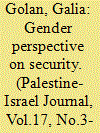

|
|
|
|
|
| Publication |
2011.
|
| Summary/Abstract |
The Van Leer Program on Women in Public Life recently held a discussion on gender perspectives on issues in the Israeli-Palestinian conflict. Women dealt with the core issues of the conflict, namely borders, settlements, refugees, etc. in an attempt to determine if a gender perspective would add or otherwise change the negotiators' approach to these issues. This was not the often-held discussion on women and peace or whether or not women are more peace-loving than men, but rather an effort to see if a look at the issues through a different lens might produce a different approach or suggest something not noticed before. One of these issues is that of security arrangements - an area generally perceived to be the exclusive domain of former military or security figures, most of whom are male.
|
|
|
|
|
|
|
|
|
|
|
|
|
|
|
|
| 7 |
ID:
139244
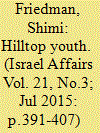

|
|
|
|
|
| Summary/Abstract |
In the first decade of this century, a new social group, popularly called the ‘hilltop youth’, came to the attention of Israeli society. This group consisted of a small number of young people who took part in aggressive political actions including illegal settlement endeavours throughout Judea and Samaria. Before their arrival at the various wilderness outposts, these youth had not developed any political outlook in regard to Jewish settlement in these areas; it was only during their period of habitation did they tend to adopt and utilize views informed by ideological and cultural extremism. The manifestation of this socio-political phenomenon will be analysed from sociological and anthropological perspectives in order to shed light on social aspects of Israeli society, as well as to elucidate frequently unclear political and policy implications in the larger Middle Eastern context. In addition, this article describes the significance of a youth subculture that has emerged in this frontier political space, and which has often been cast in criminological terms. To buttress the claims advanced in this study, a psychological-sociological approach is also employed.
|
|
|
|
|
|
|
|
|
|
|
|
|
|
|
|
| 8 |
ID:
165824
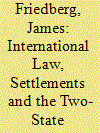

|
|
|
|
|
| Summary/Abstract |
The Hague and Geneva Conventions mandate that the settlements in the West Bank and the Arab neighborhoods of East Jerusalem are illegal, and a peace agreement must adhere to international norms of justice if it is to secure the buy-in of stakeholders.
|
|
|
|
|
|
|
|
|
|
|
|
|
|
|
|
| 9 |
ID:
163192
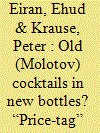

|
|
|
|
|
| Summary/Abstract |
In the early morning of July 31, 2015, masked attackers threw firebombs into two Palestinian homes in the West Bank village of Duma, south of Nablus, killing three Palestinian civilians. Contrary to claims by Israeli and Palestinian politicians, this attack was neither an isolated anomaly nor just another incident of settler violence. Instead, it was the latest attack in an important but largely unknown phenomenon called “price-tag,” in which a loosely connected group of young Israelis called “hilltop youth” burn Palestinian mosques and destroy property in hundreds of attacks accompanied by threatening graffiti that references Israeli settlers, outposts, and anti-Arab slogans. Using an original dataset of price-tag incidents and interviews with key actors, we demonstrate that the perpetrators, targets, and strategies of price-tag are different than previous patterns of settler violence. Whereas previous settlers saw the Israeli state as legitimate and largely decided to cooperate with it, the hilltop youth have decided to confront it by using price-tag attacks to deter settlement withdrawals and chain-gang the state into a conflict with the Palestinians. This analysis of the strategic logic of price-tag reveals its potential to shift the political landscape within and between Israelis and Palestinians.
|
|
|
|
|
|
|
|
|
|
|
|
|
|
|
|
| 10 |
ID:
151088
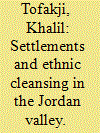

|
|
|
|
|
| Summary/Abstract |
In recent years, the Israeli government has intensified its settlement activities in the Jordan Valley, in a policy that essentially amounts to ethnic cleansing.
|
|
|
|
|
|
|
|
|
|
|
|
|
|
|
|
| 11 |
ID:
084990
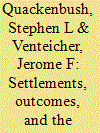

|
|
|
|
|
| Publication |
2008.
|
| Summary/Abstract |
Despite the hope that the resolution of one militarized dispute will bring peace to a dyad, these conflicts often recur. This recurrence of conflict is particularly important because subsequent disputes within a dyad tend to be more severe than previous ones. However, the factors leading to recurrent conflict remain a matter of debate. While some argue that the settlement of a dispute has a significant impact on post-conflict relations, others argue that the outcome of a dispute is the most important determinant of post-conflict stability. Although evidence has been found to support both views, the relative impact of dispute settlements and outcomes has not been satisfactorily determined. Accordingly, this article simultaneously examines the relationship between settlements, outcomes, and conflict recurrence through survival analyses of the periods of peace following 2,973 dyadic militarized interstate disputes between 1816 and 2001. The authors find that although settlement type is an important predictor of recurrent conflict, with imposed settlements being the most stable, outcome type has no significant effects on post-dispute peace duration. The article concludes with a preliminary analysis of the factors that lead to the varying forms of settlement.
|
|
|
|
|
|
|
|
|
|
|
|
|
|
|
|
| 12 |
ID:
139248
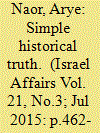

|
|
|
|
|
| Summary/Abstract |
Begin's ideology with regard to Judea, Samaria and Gaza was based on historical, theological and security related grounds, leading him to conclude that the Jewish people have an eternal, sacred right to the land. This was the basis for his settlement policy as prime minister and for the Palestinian autonomy proposal he made – both meant to prevent a division of the Land of Israel.
|
|
|
|
|
|
|
|
|
|
|
|
|
|
|
|
|
|
|
|
|